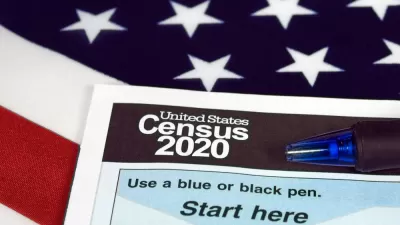A budget shortfall for Census 2020 has already claimed one victim: the timely delivery of the five-year Economic Census.

The Economic Census has been postponed for six months, according to reports, meaning the government will not produce important data about economic activity, jobs, revenue, and more five years after the previous Economic Census.
According to an article by Danny Vinik, "the Census Bureau quietly changed its deadline, pushing it back at least six months," earlier this year. "The agency told POLITICO that it has not publicly announced the delay but confirmed that aspects of the Economic Census were "re-planned," and the results would be out six months late."
The reason for the delay has been blamed on a shortfall of funding. Money that should have gone to the Economic Census instead went to the 2020 Decennial Census. The larger, more famous effort of the Census Bureau is so short of money, in fact, that Commerce Secretary Wilbur Ross went before a House panel to inform them of an "urgent need" for more funding. New estimates place the cost of the 2020 Census at $15.6 billion, or a 27 percent increase from estimates produced by the Obama Administration.
Back to the Economic Census, Vinki writes that the delayed report could have negative effects down the line: "it leaves outdated baseline numbers in place for policymakers, and creates problems for companies that need to comply. Said another census-watcher of the 2017 survey: 'It will always have this asterisk.'"
Vinik also expands the discussion about the threats to the Census beyond congressional budgets and White House neglect, namely, that people don't answer surveys the way they used to. For more information about the preparation process leading up to the 2020 Census, see Planetizen's previous coverage.
FULL STORY: Is Washington bungling the Census?

Trump Administration Could Effectively End Housing Voucher Program
Federal officials are eyeing major cuts to the Section 8 program that helps millions of low-income households pay rent.

Planetizen Federal Action Tracker
A weekly monitor of how Trump’s orders and actions are impacting planners and planning in America.

Canada vs. Kamala: Whose Liberal Housing Platform Comes Out on Top?
As Canada votes for a new Prime Minister, what can America learn from the leading liberal candidate of its neighbor to the north?

Washington State’s Parking Reform Law Could Unlock ‘Countless’ Acres for New Housing
A law that limits how much parking cities can require for residential amd commercial developments could lead to a construction boom.

Wildlife Rebounds After the Eaton Fire
Following the devastation of the Eaton Fire, the return of wildlife and the regrowth of native plants are offering powerful signs of resilience and renewal.

LA to Replace Inglewood Light Rail Project With Bus Shuttles
LA Metro says the change is in response to community engagement and that the new design will be ready before the 2028 Olympic Games.
Urban Design for Planners 1: Software Tools
This six-course series explores essential urban design concepts using open source software and equips planners with the tools they need to participate fully in the urban design process.
Planning for Universal Design
Learn the tools for implementing Universal Design in planning regulations.
Central Transportation Planning Staff/Boston Region MPO
Heyer Gruel & Associates PA
Institute for Housing and Urban Development Studies (IHS)
City of Grandview
Harvard GSD Executive Education
Regional Transportation Commission of Southern Nevada
Toledo-Lucas County Plan Commissions




























